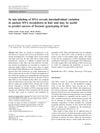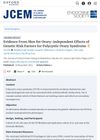 August 2024 in “Skin Research and Technology”
August 2024 in “Skin Research and Technology” Omega-6 and LDL cholesterol increase the risk of hair loss.
Editing the FGF5 gene in sheep increases fine wool growth.
 1 citations,
April 2023 in “International Journal of Molecular Sciences”
1 citations,
April 2023 in “International Journal of Molecular Sciences” New CRISPR/Cas9 variants and nanotechnology-based delivery methods are improving cancer treatment, but choosing the best variant and overcoming certain limitations remain challenges.
 27 citations,
April 2011 in “International journal of legal medicine”
27 citations,
April 2011 in “International journal of legal medicine” In situ DNA labeling in hair can help predict forensic DNA analysis success.
 15 citations,
February 1999 in “The anatomical record”
15 citations,
February 1999 in “The anatomical record” Some mutant mice have hair with abnormal cross-linking, mainly in the cuticle, not affecting other hair parts.
 12 citations,
December 2017 in “Food and chemical toxicology”
12 citations,
December 2017 in “Food and chemical toxicology” Permanent hair dye mixtures can irritate and damage the skin.
50 citations,
May 2021 in “Frontiers in immunology” Certain immune cells contribute to skin autoimmune diseases, and some treatments can reverse hair loss in these conditions.
7 citations,
August 2008 in “Immunogenetics” A gene mutation in mice causes increased mast cells and disorganized hair follicles in their skin.
 111 citations,
January 2007 in “Seminars in cell & developmental biology”
111 citations,
January 2007 in “Seminars in cell & developmental biology” Hair, teeth, and mammary glands develop similarly at first but use different genes later.
 74 citations,
July 2008 in “Journal of Dermatological Case Reports”
74 citations,
July 2008 in “Journal of Dermatological Case Reports” Trichoscopy is a quick and easy way to diagnose most genetic hair problems without invasive methods.
 71 citations,
April 2020 in “Journal of Cosmetic Dermatology”
71 citations,
April 2020 in “Journal of Cosmetic Dermatology” Genetic differences may affect COVID-19 deaths; anti-androgens could be potential treatment.
 39 citations,
May 2011 in “Human Immunology”
39 citations,
May 2011 in “Human Immunology” Genetics play a role in acne, but how exactly they contribute is not fully understood.
37 citations,
January 2005 in “Clinics in dermatology” Recent progress has been made in understanding inherited hair and nail disorders.
 26 citations,
August 2014 in “Genetic Testing and Molecular Biomarkers”
26 citations,
August 2014 in “Genetic Testing and Molecular Biomarkers” High levels of TNF-α may contribute to obesity and insulin resistance in PCOS, but not due to the C850T genetic variation.
20 citations,
March 1975 in “Journal of steroid biochemistry/Journal of Steroid Biochemistry” The study concludes that a genetic mutation in TFM mice leads to reduced androgen receptor activity, affecting the body's response to male hormones.
 11 citations,
November 2021 in “The Journal of Clinical Endocrinology and Metabolism”
11 citations,
November 2021 in “The Journal of Clinical Endocrinology and Metabolism” Genetic risk factors for Polycystic Ovary Syndrome can affect men too, not just women.
 5 citations,
February 2019 in “The New England Journal of Medicine”
5 citations,
February 2019 in “The New England Journal of Medicine” Certain mutations in the PADI3 gene may increase the risk of developing a type of scarring hair loss common in women of African descent.
 1 citations,
July 2014 in “Hormones”
1 citations,
July 2014 in “Hormones” Over a third of women thought to have non-classical congenital adrenal hyperplasia didn't have it confirmed by genetic tests.
 1 citations,
October 2013 in “Our Dermatology Online”
1 citations,
October 2013 in “Our Dermatology Online” 5α reductase type 2 enzyme mutation and oxidative stress may increase androgenetic alopecia risk in Egyptians.
 December 2022 in “Curēus”
December 2022 in “Curēus” Genetic testing confirmed a young girl has Atrichia with Papular Lesions due to mutations in the hairless gene.

A new mutation in the CYP11B1 gene was found in a woman with mild hyperandrogenemia, a rare cause of non-classic congenital adrenal hyperplasia.
 October 2014 in “Journal of Minimally Invasive Gynecology”
October 2014 in “Journal of Minimally Invasive Gynecology” Genetic testing for cancer risk can lead to early and life-saving treatments in people without symptoms.
 August 1994 in “Molecular Endocrinology”
August 1994 in “Molecular Endocrinology” Changing protein kinase levels in pituitary cells affects calcium flow and beta-endorphin release.
 May 2008 in “Hair transplant forum international”
May 2008 in “Hair transplant forum international” A genetic test can identify people at risk of male pattern baldness early, allowing for quicker treatment.
 January 2024 in “Australasian journal of dermatology (Print)”
January 2024 in “Australasian journal of dermatology (Print)” A boy's hair turned red because of genetic mutations, not lack of zinc.
 16 citations,
April 2018 in “Animal Genetics”
16 citations,
April 2018 in “Animal Genetics” Researchers found two genes that may explain why some Casertana pigs don't have hair.
 1 citations,
November 2017 in “Expert opinion on orphan drugs”
1 citations,
November 2017 in “Expert opinion on orphan drugs” Scientists now better understand the genetics of hypohidrotic ectodermal dysplasia, leading to more accurate diagnoses and potential new treatments.
12 citations,
January 1987 in “Ophthalmic Paediatrics and Genetics” Early diagnosis and treatment of biotinidase deficiency are crucial to prevent vision problems.
 2 citations,
October 2021 in “bioRxiv (Cold Spring Harbor Laboratory)”
2 citations,
October 2021 in “bioRxiv (Cold Spring Harbor Laboratory)” The DNA of ancient Koreans from the Three Kingdoms period shows a mix of northern Chinese and Japanese-Jomon ancestry, revealing two distinct genetic groups.
 December 2024 in “Medical Review”
December 2024 in “Medical Review” Organoids help study and treat genetic diseases, offering personalized medicine and therapy testing.
























